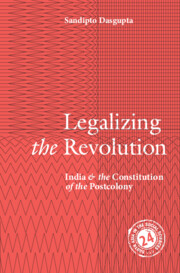
- Publisher:
- Cambridge University Press
- Online publication date:
- May 2024
- Print publication year:
- 2024
- Online ISBN:
- 9781108781039
Last updated 10th July 2024: Online ordering is currently unavailable due to technical issues. We apologise for any delays responding to customers while we resolve this. For further updates please visit our website https://www.cambridge.org/news-and-insights/technical-incident


Anticolonial movements of the twentieth century generated ambitious ideas of freedom. Following decolonization, the challenge was to give an institutional form to those ideas. Through an original account of India's constitution making, Legalizing the Revolution explores the promises, challenges, and contradictions of that task. In contrast to derived templates, Dasgupta theorizes the distinctively postcolonial constitution through an innovative synthesis of the history of decolonization and constitutional theory. The book traces the contentious transition from the tumult of popular anticolonial politics to the ordered calculus of postcolonial governance; and then explains how major institutions – parliament, judiciary, rights, property – were formed by that foundational tension. A major contribution to postcolonial political theory, the book excavates the unrealized futures of decolonization. At the same time, through a critical account of the making of the postcolonial constitutional order, it offers keys to understanding the present crisis of that order, including and especially in India.
‘In this important contribution to political and constitutional theory, Sandipto Dasgupta tracks the distinctive character and logic of the postcolonial constitution. Rather than closing a revolution, constitutions in the decolonizing world were designed to facilitate the revolution to come. Examining the antinomies of this ‘transformational constitutionalism’ to prompt a wider reconsideration of the ends of constitutionalism, Legalizing the Revolution models postcolonial political theory at its best.’
Adom Getachew - University of Chicago
‘In this remarkable new study, Sandipto Dasgupta offers a fascinating examination of a great paradox of modern history: how in the process of decolonization, a revolution - the activity maximally opposed to legal order - seeks to produce, out of itself, a constitution, the primary device for the creation of an expansive, stable legal system. The argument of the book joins together two strands of analysis rarely brought together: the tumultuous history of the events of decolonization and the tranquil discussion of provisions of effective legality. It follows the acts of the double authors of the constitutional document: the people in whose name it is written and the actual writers who shape its detailed provisions. This is an intelligent and insightful exploration of the founding moment of the world’s largest democracy - an important contribution to the political theory of decolonization.’
Sudipta Kaviraj - Columbia University
‘This account of the origins of the Indian constitution is nothing short of heroic, and its relevance to our global present is plain. Arrestingly, Sandipto Dasgupta lifts promotional and romanticizing frames - however appealing in the face of far-right politics today - in order to recapture the promise of postcolonial democracy without ignoring imperial legacies of constitutionalism itself and material realities that elite legalism confirmed as much as challenged. Lurking beneath contemporary appropriations that excessively centre rights and judges rather than class and parliamentarism, Dasgupta provides authentic access to the stakes of the moment - and our own.’
Samuel Moyn - Yale University
 Loading metrics...
Loading metrics...
* Views captured on Cambridge Core between #date#. This data will be updated every 24 hours.
Usage data cannot currently be displayed.